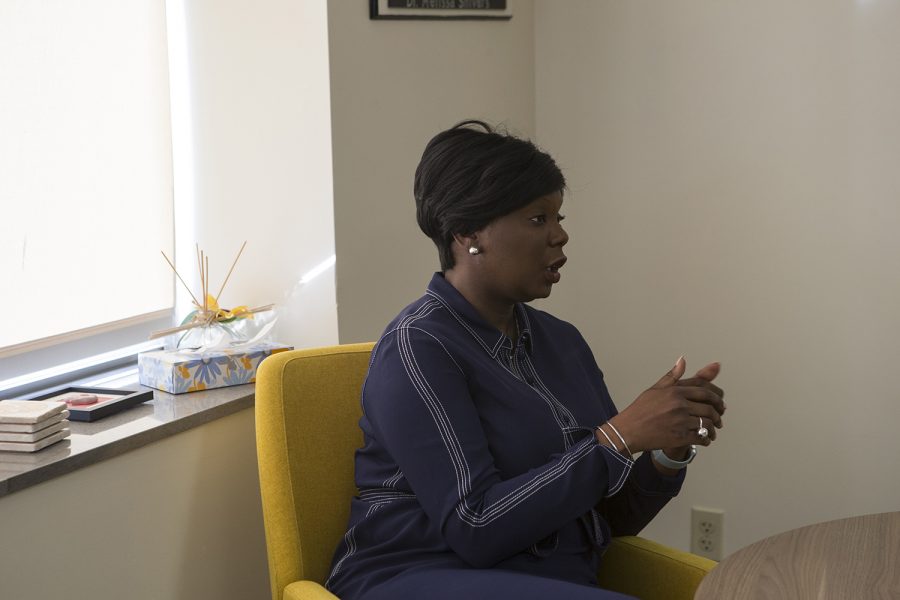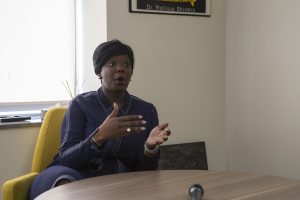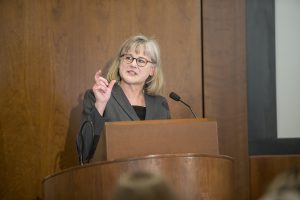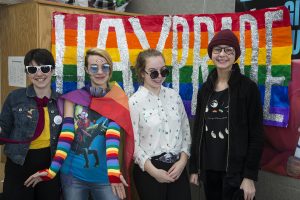UI boosting late-night programming as alternative to drinking on weekends
Late-night programming options are seeing a boost in support as the UI works on alcohol harm-reduction efforts.
UI Vice President for Student Life Melissa Shivers speaks in an interview with The Daily Iowan on Feb. 21, 2019.
February 25, 2019
University of Iowa officials are providing more late-night programs for those students who seek alternatives to drinking for nighttime entertainment.
The university has offered late-night programming for around the last decade as part of its alcohol-harm-reduction efforts to provide students with options for alcohol-free entertainment.
Late-night programming is any type of event offered Thursday through Saturday that starts at 10 p.m. or earlier and runs until at least midnight.
The Campus Activities Board, UI Housing & Dining, and Recreational Services have been hosts of and partners for such events. Since 2010, student governments have also supported the programming, contributing $75,000 per year, The Daily Iowan has previously reported, and the UI has contributed $125,000 per year.
According to a report from the 2017-18 academic year, high-risk alcohol consumption among UI students declined by 28 percent from 2009 to 2017, but the issue remains a concern for university officials, because 56.6 percent of students report having experienced a negative consequence from drinking in the last year.
“This is the thing we hear over and over is, ‘Well, there’s nothing else to do but drink,’ ” said Tanya Villhauer, Student Life’s director of student well-being and harm reduction. “… How do we as a university provide all these options and let the students know what they want to know when they’re ready to know about it?”
Data collection is now possible thanks to SWIPE technology, introduced in the fall semester, so officials have a better understanding of which programs and educational opportunities students have engaged in.
RELATED: Graduate Iowa City donates to UI to fund alcohol-alternative activities
Nellie Link, the associate director of campus programs and student activities for the Center for Student Involvement & Leadership, said in an email to The Daily Iowan that the Division of Student Life has had nearly 3,000 students participate in late-night programming since data collection began in September 2018. This number does not include programs that occurred at the very beginning of the year.
Link said officials use a survey that asks students to report how likely it is that they would be doing something involving alcohol if they were not attending the event and to provide additional demographic information, such as whether students live on or off campus. She noted that they will be able to report more about the data at the end of the semester.
“Late-night programming is an important initiative on campus to help support the university’s alcohol-harm-reduction efforts,” she said. “The events and programs are designed to be exciting, relevant, attractive to a wide variety of student interests. We are so grateful to the support of colleagues across campus and in our community to help reduce harm related to alcohol use and provide an engaging experience for our students.”
UI Vice President for Student Life Melissa Shivers said she believes the UI can help assist with retention and persistence to graduation through initiatives such as late-night programming.
“… As many ways as we can try to connect with those students who may not be sort of the students who are the most involved, students who are just looking for ways to get involved in ways that are easier and more accessible for them, those are very important student populations that we need to get connect with,” she said.
After a recent gift of $50,000 from the Graduate Iowa City to support late-night programming, Shivers said, the hope is that more prospective donors will come forward to bolster the efforts.
“My dream is that every student who comes to the University of Iowa would have an awareness, and we would love it if they had the opportunity and engaged in the opportunity to participate in these types of activities,” she said. “And the more financial support that we can receive to broaden the scope and increase the number of programs is only going to benefit our students.”






